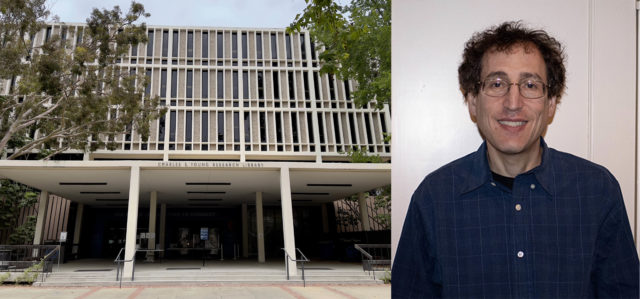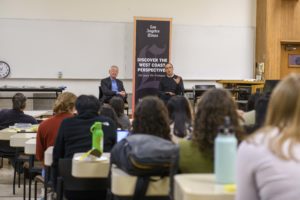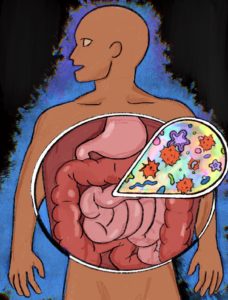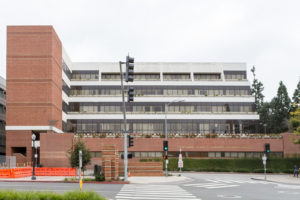On Tuesday, James Druckman, a professor of political science at the University of Rochester, presented to around 20 students and faculty on the relationship between growing distrust in science and growing division in politics.
The event, hosted by the UCLA Library and the Jacob Marschak Interdisciplinary Colloquium on Mathematics in the Behavioral Sciences, focused on partisan realignment, which has resulted in two political parties organizing and functioning on knowledge stemming from different beliefs. Druckman began with a speech and then moved directly into a Q&A.
To open the discussion, Druckman brought up the 2000 presidential election – one decided by 537 votes and a Supreme Court decision, he said. He said specific events have led to a changing landscape in American politics, including 9/11, the rise of social media, Black Lives Matter protests, the Great Recession and the crux of his study, the COVID-19 pandemic.
“If we want to capture 21st-century American politics, this is the experience. It’s a little alarming when you walk through it,” Druckman said. “This is their (undergraduates’) political lives and their social lives.”
Druckman said the United States fared relatively poorly in terms of mortality rates in comparison to other nations, and he attributed that partially to political partisanship – specifically in line with mortality post-vaccine availability. To support his claims, Druckman showed data of Republican votes by county and mortality to demonstrate that Republican counties contributed negatively to the country’s total mortality and vaccination rates.
“This has been a constant theme since the beginning of the pandemic,” Druckman said. “It looks like Republican counties are getting worse, … and that reflects how American politics have gone. During those 24 years that I just talked about, you’re seeing these massive divides in American politics.”
He added that partisanship and the ability to trust science have affected the consumption of COVID-19 news, which had an effect on wearing masks, social distancing and vaccinations. Similarly, he added that data verifies that those unvaccinated were most likely to bring up trust as the reasoning behind not getting the vaccine.
Druckman said another critical aspect of partisanship was the switch in trust in science between parties, which has been measured by determining which states’ residents are more likely to wear seat belts in a car. In the 1970s, Republican states were more likely to have a higher trust in seat belts and by extension science, he said – perhaps because of the space exploration of the late 20th century – but the country has reversed its course as of 2020.
“The bottom line is that polarization of trust in scientists has significant consequences not just for individuals but for how the political system is functioning in and of itself,” he said.
Druckman ended his presentation with what he said was a silver lining: Trust in scientists, while not perfect, is higher than perspectives might show. He said people who tend to believe in science are more likely to be members of the Democratic Party and also tend to belong to certain demographics – white, male, of high socioeconomic status and well-educated. Druckman added that certain people might appreciate science as a concept but not trust the vessel it is delivered in.
In the half-hour-long Q&A after the speech, Druckman fielded questions on his studies’ research methods and about trust in political institutions and science.
His main goal, however, was to have people come out of the speech with an expanded view of the impact of variations in scientific viewpoint on the government, Druckman said after the presentation in an interview.
“I hope they took away that beliefs about expertise are quite varying across different partisans,” he said. “That variation is creating disjuncture in our political system that could make governance more difficult, so it’s something we should think about in terms of having functional governance.”
Druckman added that UCLA professor of political science Lynn Vavreck was influential to him as a researcher and critical to the success of his most recent research.
“I’ve been fortunate to have a lot of mentors and good colleagues – it’s hard to name one person,” he said. “Lynn has had an important impact, watching how she organizes really large data collection projects, which this was, so she advised us when we were first getting started on how to go about collecting these types of data.”
Vavreck said in an emailed statement that she believed that Druckman was fundamentally crucial to her as a researcher, and that his mind was impactful to the conversation.
“Jamie (James) Druckman shaped the framing in my first book, The Message Matters, and fundamentally changed how I was thinking about the argument,” she said in the statement. “When he shares his mind with you, you realize how special he truly is.”
One of Vavreck’s students, Ryan Baxter-King, a doctoral student in political science, said this talk tied into his research with Vavreck on trust in COVID-19 vaccines and masking guidelines in an impactful way.
“We’ve thought a lot about partisanship, and we’ve thought a good amount about political trust, but having all this evidence put together in this way is really clarifying for us,” Baxter-King said.






Comments are closed.